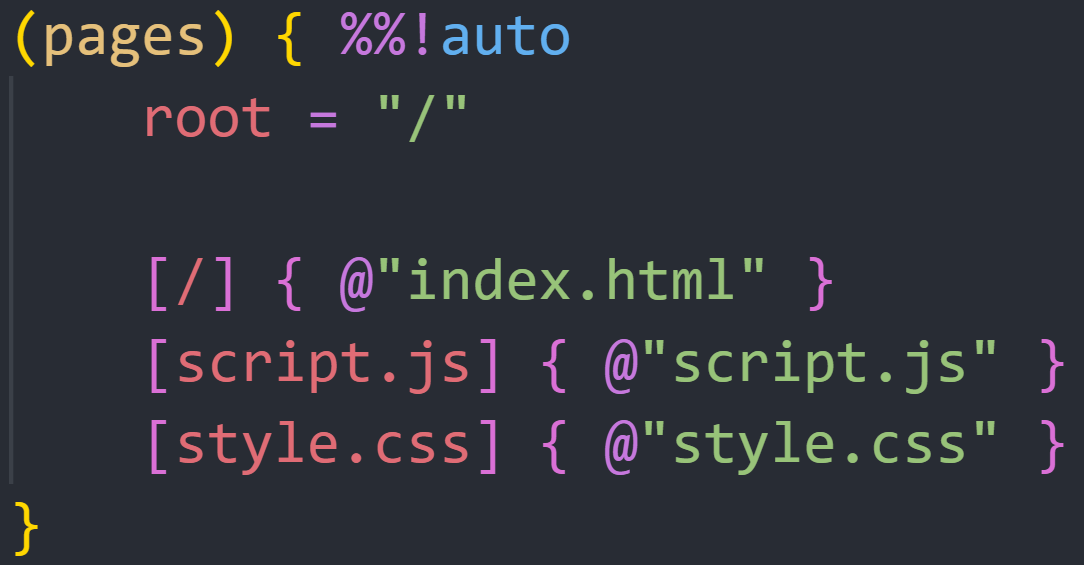pagez v1.4.3
Pagez 
Allows to declare pages and add a bit of post-processing to them.

Usage
(pages.np)
(pages) { %%!auto
root = "/"
[/] { @"index.html" }
[script.js] { @"script.js" }
[style.css] { @"style.css" }
}(index.js)
const { Pages, builtinLib } = require('pagez');
const pages = new Pages()
.addFile('pages.np')
.use(builtinLib)
.build({
defaultSource: 'public',
outputPath: 'dist'
})
;The above example would parse the pages file, store and minify the HTML and JS files from source in a dedicated dist folder.
We can also plug it into an HTTP server, which would look like this:
(index.js)
const { Pages, builtinLib } = require('pagez');
const http = require('node:http');
const pages = new Pages()
.addFile('pages.np')
.use(builtinLib)
.build({
defaultSource: 'public',
outputPath: 'dist'
})
;
const server = http.createServer(
( req, res ) => {
const url = new URL(req.url, `http://${req.headers.host}`);
const page = pages.getPage(url.pathname);
if (page) {
res.statusCode = 200;
for (const [k,v] of Object.entries(page.page.props.__headers||{}))
res.setHeader(k,v);
res.end(page.body);
} else {
req.statusCode = 404;
res.end();
}
}
);
server.listen(8080,'localhost',()=>console.log('Ready!'));Pagez Language (Nogis Pagez)
A namespace is denoted by parenthesis, and its body by curly braces:
(pages) {
}Inside it may be properties, like the root path of the namespace:
(pages) {
root = "/"
}As well as pages, with their name denoted by square braces and their body by curly braces:
(pages) {
root = "/"
[/] {
}
}To indicate the path of the resource, we can use the @ symbol followed by the path between quotes:
(pages) {
root = "/"
[/] {
@"index.html"
}
}But we might want to minimize it, and for this we can tag it with min:
(pages) {
root = "/"
%min
[/] {
@"index.html"
}
}While we're there, we could also want to tell the client what kind of ressource it is (not particularily useful here, but it might be in other cases):
(pages) {
root = "/"
%min
%kind<"text/html">
[/] {
@"index.html"
}
}But, using only kind without giving it an argument will auto-detect which one it is based on the path's extension. Moreover, we can use the auto macro that does all of that:
(pages) {
root = "/"
%!auto
[/] {
@"index.html"
}
}But if there is a feature we wouldn't like to be applied we can use a dash to cancel it:
(pages) {
root = "/"
%!auto
%-min
[/] {
@"index.html"
}
}And if we have multiple pages, we can place them in curly braces and put the decorators on top:
(pages) {
root = "/"
%!auto
{
[/] { @"index.html" }
[script.js] { @"script.js" }
[style.css] { @"style.css" }
}
}As we are applying auto to all of the pages, we can move it to the very top and add another `%` to signify it is global:
(pages) { %%!auto
root = "/"
[/] { @"index.html" }
[script.js] { @"script.js" }
[style.css] { @"style.css" }
}